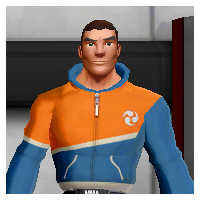Gameplay Style vs. Work Style
The theme of this article came to me a few weeks ago after sitting down with my co-workers to decide what our next game should be. I thought it would be fun to explore any consistencies between the types of games people like

At the start of the year I sat down with my co-workers individually to discuss their own personal thoughts on what our next game should be. I wanted to do this on a number of levels:
What were their own personal preferences, what floats their boat, what types of games do they like to spend most of their valuable personal time with?
What specific features would they like to be involved with? Art style, game mechanics, dynamics, methodologies? Are there any specific platforms or genres of game they particularly want to be involved with.
What type of game(s) do they feel are more commercially viable? What do they think will work, what won’t work etc.
I decided to kick things off in a ‘one-to-one’ environment, as some personalities are stronger than others, and often in an open environment, the quieter people are not always heard. This way I could methodically account for everyone’s point of view and then, with my non-biased hat on, try to make sense of everyone’s thoughts and formulate their ideas into some sort of short list to present back to the studio. I also wanted to ensure that whatever game we opt to produce next is fun for everyone involved (one of our core principles at Rivet).
We’re a relatively small studio, so I was hopeful that I could get through all of these ‘one-to-ones’ in a couple of days.
My initial expectations for the meetings would be that the technical architects would be pitching in ideas for servers, multiplayer lobbies, MMO mechanics, data-driven strategies etc. and that the art guys would be throwing lots of art styles at me, famous artists, lighting effects etc. etc. I also expected a large mix of games that they like to play. Of course I expected the biggies like ACIII, WoW, CoD etc. but also Tablet games, Facebook games, Steam and more.
I kicked things off with our CEO. His background is technical so I initially expected him to come forward with some preferences on server technology, maybe some engines to explore, and also some thoughts on how he wanted the studio to be represented through the game. He was also into a vast array of video games, from classics like Super Mario and Donkey Kong through to Assassins Creed, Battlefield and Call of Duty. He went into great detail of how he had perfected the art of ‘head-shots’ in first person shooters (specifically Battlefield I believe) :o) He also mentioned a lot of RTS games and simulators – Sim City, Empires and Allies, Civilizations, other God Games and more… a real catalogue of multi-genre games.
Next was our Principal Programmer. Being a family man these days (like me) all he really gets time for is the odd casual game on mobile or tablet. I expected him to come forward with some ideas for prototyping, maybe some different ideas for game engines, and how we may be able to produce multiple games using the same mechanics etc.
One of our Artists was interesting – again, I expected maybe some arty references… maybe some heroes of art or throwing in some recent mammoth milestones like Journey, Eden, Trine2 or other related arty breakthroughs. His personal preferences in gaming were also quite varied, however seemed to have a fairly common denominator – anything that is immersive, games that invoke and emotional reaction, games that genuinely reward players for investment of time.
The above examples are a small selection of what was two fun-filled days of one-to-one meetings with all of our team members. I’ve chosen those three as they stood out from the rest, however EVERYONE had something in common… they all surprised me in their feedback and presented ideas that a) I did not expect, and b) explored areas outside of their core areas of expertise.
This was very much a welcome surprise.
Our CEO was extremely passionate about the way Rivet’s games ‘looked’; the way the style truly represented what we wanted to be as a studio moving forward. Our Lead Programmer came forward with clear commercial strategies, whilst our artists presented endless game design mechanics and dynamics.
This to me was really refreshing, to see a bunch of talented individuals from different backgrounds and disciplines, not only exploring other areas of games development, but having a genuine emotional interest into the areas of development that are not necessarily associated with their primary skill sets.
However, one more thing also occurred to me after post-analyzing these meetings:
I know these guys well. I work with them all, day in, day out, 5 days a week, and we are all emotionally invested into our games and our studio. And something clicked…
From getting a better understanding of the types of games everyone liked playing, the way they liked to play games, their gaming habits etc. can we relate these gameplay styles to the way they behave and work within the studio?
Well…
Let’s go back to our CEO… he’s a funny guy. He has a wicked sense of humor. Like any classic and passionate entrepreneur he gets over-excited about ideas and is sometimes like a big kid in a bigger sweet shop. And obviously being our CEO he has built our studio from the ground up.
And the games he likes playing – this guy likes to take crack head shots at unsuspecting opponents in Battlefield… not because he wants to show off, but because it amuses him :o) He also like to build empires and armies, and invade enemy territories… he’s also pretty good at it.
Our Lead Programmer, these days, is very much a casual gamer, he’s relaxed, chilled out, and likes to balance his work life with his personal life and values each respectively.
The Artist I referred to prefers game with emotional content. He likes games that drag you into them, take you into another world detaching you from reality. Within the studio he’s the same with his work… in order to produce the best quality 2D and 3D art work he needs to first understand the inner workings of the concept, the back stories behind the characters and the over-arching themes of the game. He’s also completely 100% emotionally involved with our studio’s ethos.
I myself come from a creative background. I love artwork, audio, design, the whole nine yards, and on the studio-front, as Creative Director, get involved with all of these areas. I also like to think I have a functional mind. I get involved with production schedules, planning and project management.
On the gameplay front, I guess influenced from a game design background, I like to ‘sample’ a lot of different types of games, but if I genuinely want to play games for the fun of them I like to get hooked into ‘worlds’, storylines and themes. I like games to have me sitting back in awe… I remember being on the beta for World of Warcraft and just getting lost in their immersive environments and forgetting about the task at hand. I absolutely loved Age of Conan when that emerged (being a fan of the Conan genre anyway), for the same reasons. I love exploration, I love big ideas, and I love creativity, and all of these things keep me hooked in games.
I could go on, but I thought this would be an interesting exercise to analyze yourself within the industry, the games you like to play and how you play them, and then also your friends and colleagues. Is there a correlation between Work Style and Gameplay Style?
I’m sure if this article resonates with anyone that they’d be interested to hear about other people’s behaviors and how their own personal preferences in gaming translate to their work style.
About the Author(s)
You May Also Like







.jpeg?width=700&auto=webp&quality=80&disable=upscale)








